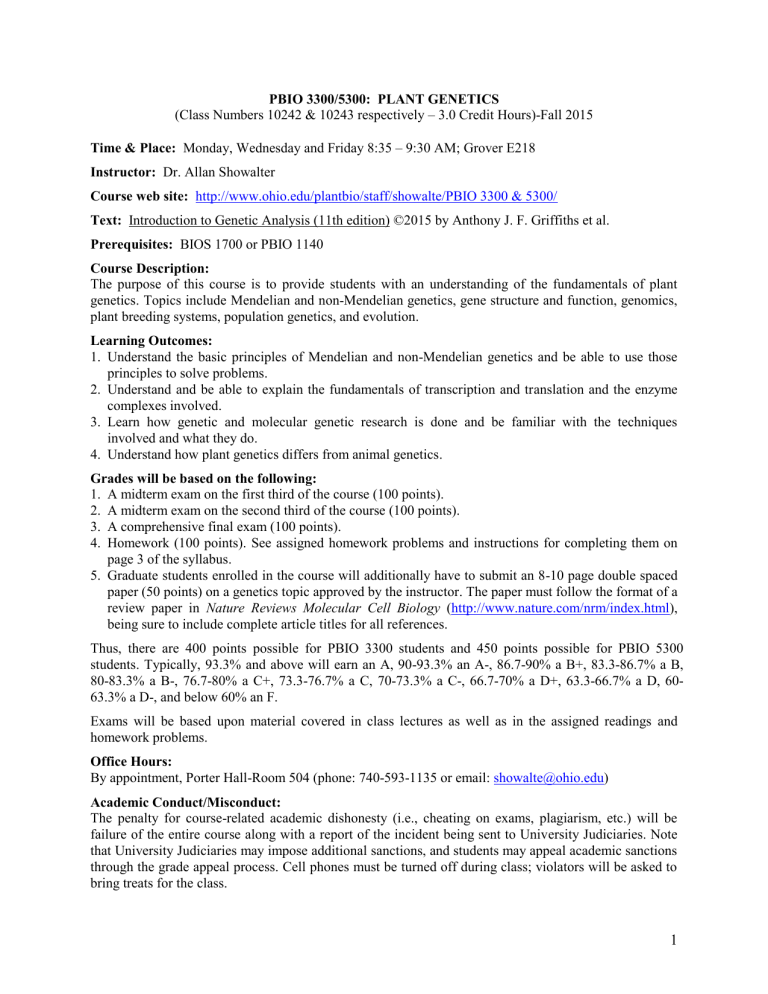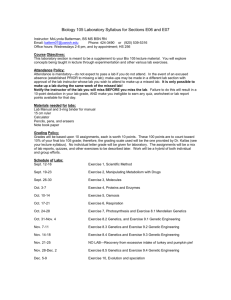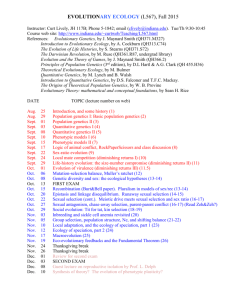MCB 730: MOLECULAR AND CELLULAR

PBIO 3300/5300: PLANT GENETICS
(Class Numbers 10242 & 10243 respectively – 3.0 Credit Hours)-Fall 2015
Time & Place: Monday, Wednesday and Friday 8:35 – 9:30 AM; Grover E218
Instructor: Dr. Allan Showalter
Course web site: http://www.ohio.edu/plantbio/staff/showalte/PBIO 3300 & 5300/
Text: Introduction to Genetic Analysis (11th edition) ©2015 by Anthony J. F. Griffiths et al.
Prerequisites: BIOS 1700 or PBIO 1140
Course Description:
The purpose of this course is to provide students with an understanding of the fundamentals of plant genetics. Topics include Mendelian and non-Mendelian genetics, gene structure and function, genomics, plant breeding systems, population genetics, and evolution.
Learning Outcomes:
1. Understand the basic principles of Mendelian and non-Mendelian genetics and be able to use those principles to solve problems.
2. Understand and be able to explain the fundamentals of transcription and translation and the enzyme complexes involved.
3. Learn how genetic and molecular genetic research is done and be familiar with the techniques involved and what they do.
4. Understand how plant genetics differs from animal genetics.
Grades will be based on the following:
1. A midterm exam on the first third of the course (100 points).
2. A midterm exam on the second third of the course (100 points).
3. A comprehensive final exam (100 points).
4. Homework (100 points). See assigned homework problems and instructions for completing them on page 3 of the syllabus.
5. Graduate students enrolled in the course will additionally have to submit an 8-10 page double spaced paper (50 points) on a genetics topic approved by the instructor. The paper must follow the format of a review paper in Nature Reviews Molecular Cell Biology ( http://www.nature.com/nrm/index.html
), being sure to include complete article titles for all references.
Thus, there are 400 points possible for PBIO 3300 students and 450 points possible for PBIO 5300 students. Typically, 93.3% and above will earn an A, 90-93.3% an A-, 86.7-90% a B+, 83.3-86.7% a B,
80-83.3% a B-, 76.7-80% a C+, 73.3-76.7% a C, 70-73.3% a C-, 66.7-70% a D+, 63.3-66.7% a D, 60-
63.3% a D-, and below 60% an F.
Exams will be based upon material covered in class lectures as well as in the assigned readings and homework problems.
Office Hours:
By appointment, Porter Hall-Room 504 (phone: 740-593-1135 or email: showalte@ohio.edu
)
Academic Conduct/Misconduct:
The penalty for course-related academic dishonesty (i.e., cheating on exams, plagiarism, etc.) will be failure of the entire course along with a report of the incident being sent to University Judiciaries. Note that University Judiciaries may impose additional sanctions, and students may appeal academic sanctions through the grade appeal process. Cell phones must be turned off during class; violators will be asked to bring treats for the class.
1
Attendance Policy:
Attendance is highly recommended. Any absences must be well justified and explained to the instructor in advance in order to make up any of the graded material.
Intellectual Property:
The lectures, classroom activities, and all materials associated with this class and developed by the instructor are copyrighted in the name of Allan Showalter.
Accommodations for Students with a Disability Policy:
Any student who suspects s/he may need an accommodation based on the impact of a disability should contact the class instructor privately to discuss the student’s specific needs and provide written documentation from the Office of Student Accessibility Services. If the student is not yet registered as a student with a disability, s/he should contact the Office of Student Accessibility Services.
2
PBIO 3300/5300: PLANT GENETICS
Syllabus - Fall 2015
8
6
7
4
5
WEEK
1
2
3
14
15
12
13
9
10
Review
11
DATE
Aug. 24
Aug. 26
Aug. 28
Aug. 31
Sept. 2
Sept. 4
Sept. 7
Sept. 9
Sept. 11
Sept. 14
Sept. 16
Sept. 18
Sept. 21
Sept. 23
Sept. 25
Sept. 28
Sept. 30
Oct. 2
Oct. 5
Oct. 7
Oct. 9
Oct. 12
Oct. 14
Oct. 16
Oct. 19
Oct. 21
Oct. 23
Oct. 26
Oct. 28
Oct. 30
Nov. 2
Nov. 4
Nov. 6
Nov. 9
Nov. 11
Nov. 13
Nov. 16
Nov. 18
Nov. 20
Nov. 23
Nov. 25
Nov. 27
Nov. 30
Dec. 2
Dec. 4
Dec. 9 (Wed.)
-
15
16
16
17
18
No Class
18
19
19
20
20
No Class
No Class
-
-
-
9
10
10
12
12
6
6
-
-
7
7
2
3
3
CHAPTER TOPICS
1 Introduction; The genetics revolution
1; pp. 793-809 Genetic model organisms; genetic nomenclature
2 Single–gene inheritance
Single–gene inheritance
Independent assortment of genes
Independent assortment of genes
No Class
4
4
Mapping eukaryotic chromosomes by recombination
Mapping eukaryotic chromosomes by recombination
Gene interaction
Gene interaction
Review
8
8
No Class
9
Exam I
DNA structure and replication
DNA structure and replication
RNA: transcription and processing
RNA: transcription and processing
Proteins and their synthesis
Proteins and their synthesis
Gene isolation and manipulation
Gene isolation and manipulation
Regulation of gene expression in eukaryotes
Regulation of gene expression in eukaryotes
13
14
14 pp. 810-811
The genetic control of development
Genomes and genomics
Genomes and genomics
Bioinformatic resources for genetics & genomics;
Exam II
The dynamic genome: transposable elements
Mutation, repair, and recombination
Mutation, repair, and recombination
Large scale genomic changes
Population genetics
Population genetics
The inheritance of complex traits
The inheritance of complex traits
Evolution of genes and traits
Evolution of genes and traits
Plant breeding systems
Macroevolutionary processes
Review
Final Exam (8:00 A.M.)
3
7
8
4
6
9
10
PBIO 3300/5300: PLANT GENETICS
Homework Problems from Introduction to Genetic Analysis (11th edition)
Complete and submit the assigned homework problems listed for each chapter on Mondays in class (or at the very next class meeting in the case of any holidays). Submit your answers as a printed word document; additional graphical information can be added by hand as needed. Once chapters are covered or introduced in lecture, homework assignments for those chapters will be due on the next Monday. Due dates may be adjusted by the instructor if necessary. Each chapter homework assignment is worth 5 points and two additional homework assignments (see bottom of this page) are worth 5 points each, resulting in 100 possible points for homework.
Chapter
1
Homework Problems (Assigned problems will be uploaded this Friday)
1, 4, 6, 8, 9, 11, 12, 13, 15, 19
2
3
2, 6, 10, 16, 27, 33, 35, 40, 43, 59
12, 13, 18, 20, 24, 27, 29, 33, 36, 51
12, 13, 14, 15, 17, 18, 24, 26, 31, 33
2, 5, 8, 16, 17, 18, 25, 32, 39, 46
3, 4, 8, 16, 21, 25, 28, 30, 33, 34
1, 6, 11, 13, 17, 18, 22, 24, 26, 30
12, 13, 22, 28, 33, 34, 36, 38, 43, 47
7, 10, 12, 14, 15, 19, 21, 26, 28, 32
12
13
14
15
16
17
2, 12, 15, 19, 20, 22, 24, 33, 34, 40
1, 2, 3, 6, 14
3, 4, 5, 10, 20, 22, 27, 28, 30, 32
1, 6, 9, 10, 12, 13, 14, 21, 24, 35
2, 3, 9, 10, 14, 15, 16, 19, 21, 23
1, 2, 3, 11, 22, 23, 32, 33, 41, 43
18
19
5, 7, 8, 9, 10, 11, 13, 18, 20, 23
7, 9, 10, 11, 14
20 2, 7, 8, 9, 10, 23
Two additional homework assignments are to be completed and submitted any time during the semester. These assignments should be printed as word documents and submitted in class.
1. Who is your favorite geneticist? Justify your answer in 1 page. (5 points).
2. Write a 1 page summary of a genetics-based seminar that you attend this semester. (5 points).
4







